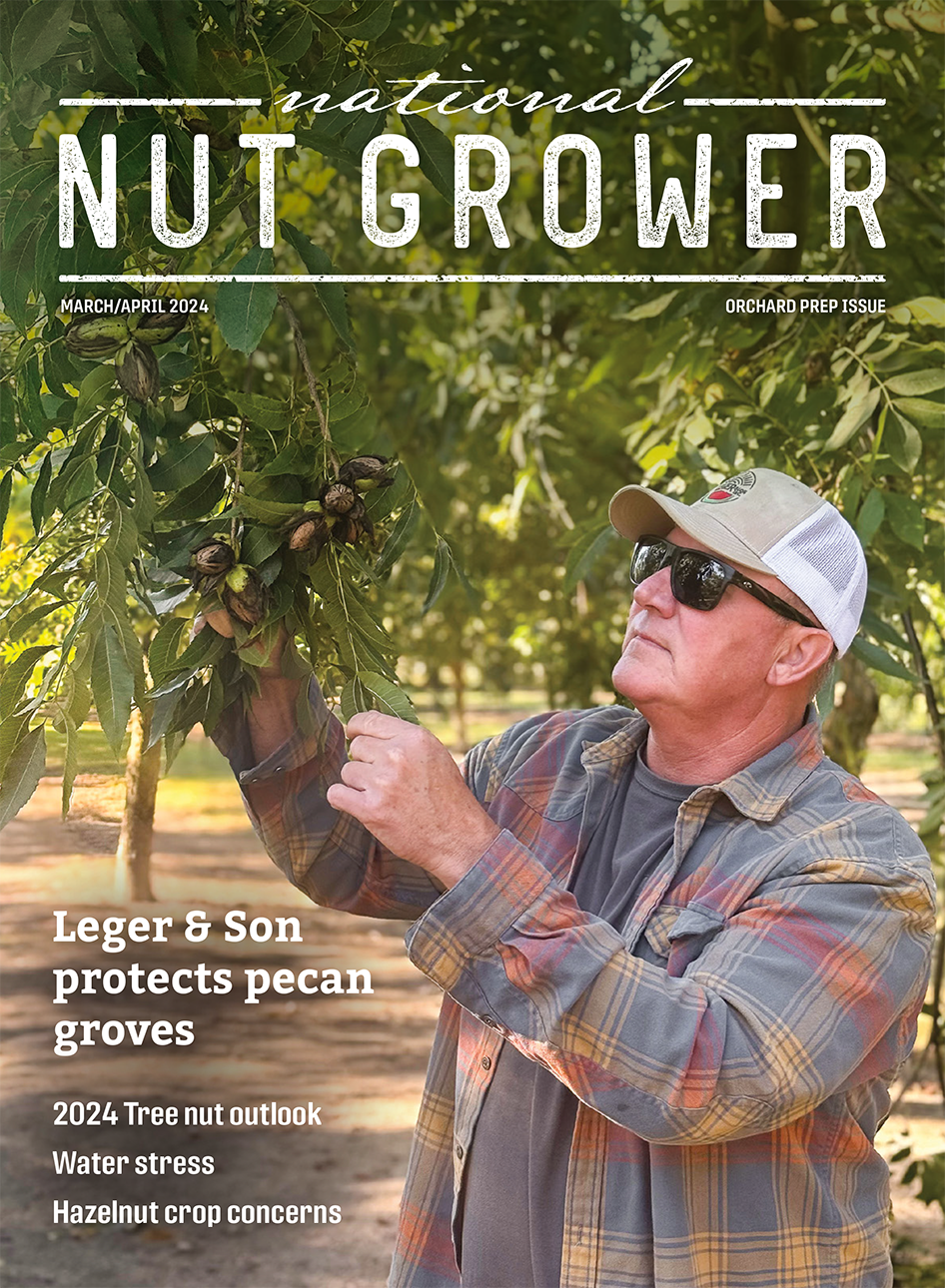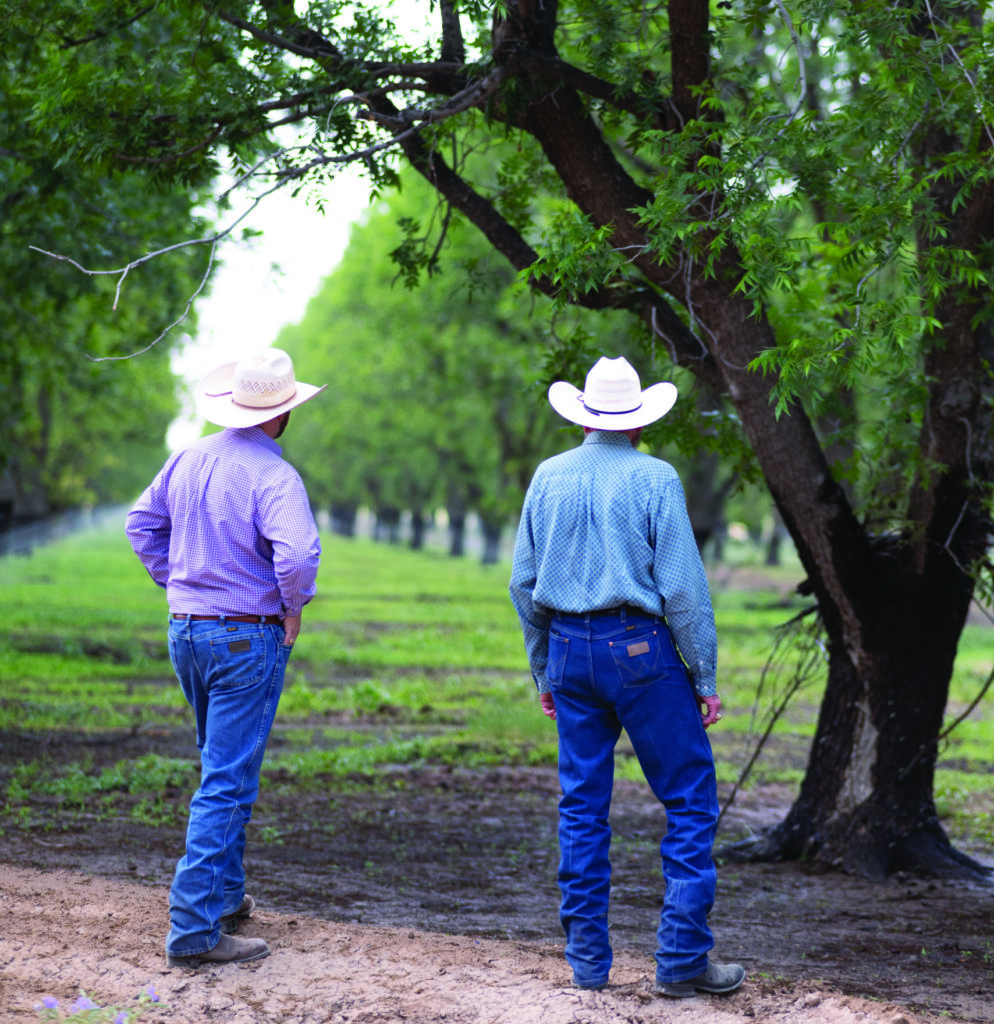
July/Aug 2022
Extensive water monitoring at Belding Farms
Like many farms, Belding Farms in Fort Stockton, Texas, landed on its current crop by watching the farming trends of the area. Belding started in the 1950s as a cotton, alfalfa and small grain operation until the profitability of these crops declined and the search began for a higher valued crop with a promising long-term upside.
Trial plantings of new crops included grapes and vegetables, but there was one crop that outperformed all the others: pecans.
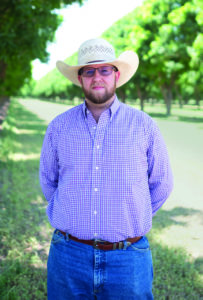
“Cotton was the bread and butter, but when it fell away, it really forced the farm’s hand to farm something else, because cotton just wasn’t profitable anymore,” said Zachary Swick, farm manager at Belding Farms. “There was a certain level of commitment when we decided to go into pecans, because it takes about 10 years to get a fully consistent high yield.”
The pecan plantings showed the greatest potential, and extensive water surveys were conducted to determine the availability and quality of groundwater needed to sustain a commercial orchard.
“Sufficient water is the limiting factor for pecan production in West Texas,” said Glenn Honaker, recently retired Belding Farms farm manager of over 30 years.
The transition to pecan was gradual, with a certain number of acres dedicated to new plantings each year. But with the investment came an equally dedicated investment in water management. Where other farms are still working with usage estimates based on eyeballing ditch levels or gas use to run pumps, Belding Farms diligently monitors its water use with flowmeters on every single production well for accurate readings.
“It’s great for our records,” said Swick, “but it’s also great for farming because it tells me how much water I’m putting into each individual block, not just on the entire farm.”
Blocks range from 10-100 acres, and data is collected daily and compiled monthly.
The intense groundwater monitoring began in the 1960s, when the region began to see a significant increase in farming activities, and the main aquifer for Belding’s area – the Edwards-Trinity aquifer at 300-700 feet – was becoming depleted. This led to the decision to tap into two different, deeper aquifers – Rustler at 1,300-1,800 feet and El Capitan at 2,800-3,100 feet. Thirty-five percent of the farm’s irrigation comes from Edwards-Trinity, 60% from Rustler and 5% from El Capitan.
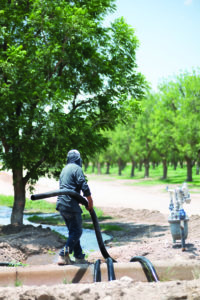
“We diversified our well field out of the data showing us that the aquifer would not be able to sustain itself at the rate it was being pumped,” said Swick. “It was a decision that was made early on to try to help manage what water we were taking on. After that, we started getting data off those other aquifers and saw that they were much more sustainable.”
All of the fields were leveled, there is no tail water, and underground pipes and concrete-lined ditches prevent water seepage as water is carried to the trees. In addition to flowmeters monitoring how much water is being pumped, air lines are monitored to determine the water levels of the aquifers. This data has been logged since the ‘60s.
It not only shows the level of the aquifers at any given time, but is also useful in correlating rainfall and other factors to aquifer levels.
Each block also has soil moisture probes to help monitor and schedule irrigation events.
“Whatever water we put on the trees, we make sure it goes on and stays there,” said Swick.
Belding was also at the beginning of high-density planting, which was also happening in the Mesilla Valley and Las Cruces, New Mexico. Belding initiated large-scale plantings in the early 1970s to establish 1,560 acres of high-density pecans.
The idea was that the trees would need more space when they got bigger, but it didn’t make sense to provide that space and wait 15-20 years as the trees filled in when they could just be moved later and the land used in a different way until then. It made more sense to transplant the trees later when necessary.
During the high-density project, hedging grabbed the farm’s attention, and Belding became among the first farms to utilize this practice.
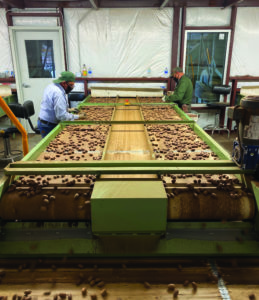
“It allows us to keep the tree at a much smaller size, we’re not messing with the roots as much, and the yield is much, much better,” said Swick. “Everybody’s chasing higher yields, and rightfully so. Everything else keeps getting more expensive, and we need to find a way to make up for that.”
Years of cultural practices, such as hedging, thinning, pruning and tree moving, have built Belding Farms into the 2,200 acres of pecans it farms today.
Most of the farm is still flood irrigated, but is beginning its potential transition to sprinkler. Having just installed sprinklers on nearly 100 acres, the farm is looking at saving 0.5-1.0 acre foot per acre over conventional flood.
“The need to develop irrigation management methods that are more efficient, effective and economical is, and will continue to be, a challenge for agriculture. Competition for water resources between agriculture, municipalities, industrial and recreational uses are increasing and will continue to increase,” said Honaker.
After wrapping the first season on sprinkler, and once the data is in, the team will analyze the results to determine if it makes sense to continue converting additional orchard blocks to sprinkler. Volume of water usage, pecan production and pecan quality will be evaluated and compared to flood irrigation.
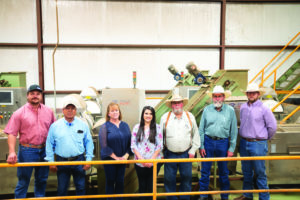
Belding Farms is family-owned, which, Swick said, has allowed the dedicated team to operate the farm in the best way possible. Many employees have been on staff for over three decades, with some as long as 40 and 50 years.
“The farm is run on a lot of trust,” Swick said. “We always feel grateful to be farming here at Belding under the trust given to us by the Cockrell family.”
Top photo: Zach Swick and Bobby Bennett observing the orchard. Photo: Destanie Franco







